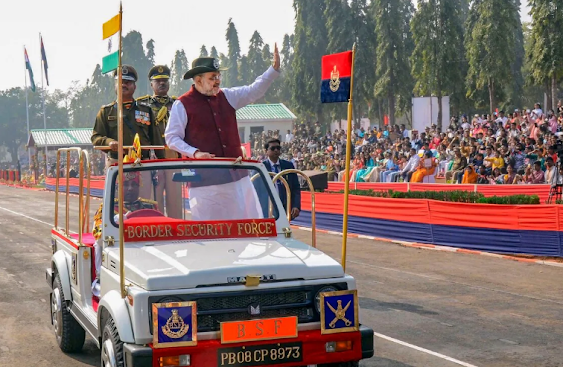A resounding declaration of commitment, Union Home Minister Amit Shah announced on Friday that India's borders with Pakistan and Bangladesh would be entirely secured within the next two years. The statement came during the Border Security Force's (BSF) 59th Raising Day celebrations in Hazaribag, Jharkhand, where Shah took the salute from a ceremonial parade.
Shah highlighted the Modi government's remarkable progress in fortifying the nation's security by fencing and addressing gaps in approximately 560 km of the India-Pakistan and India-Bangladesh borders over the last nine years. Currently, efforts are underway to close the remaining gaps in a 60 km stretch along these vital fronts.
The two borders, spanning 2,290 km along the India-Pakistan International Border and 4,096 km along the India-Bangladesh border, present unique challenges due to their diverse terrains, including long riverine, mountainous, and marshy areas. Erecting traditional fences in such regions proves challenging, leading border security forces to leverage advanced technological gadgets for effective surveillance and infiltration prevention.
Shah emphasized the pivotal role of secure borders in a nation's development, citing India's achievements under the Modi government, such as the Chandrayaan mission and elevation to the fifth spot in the global economy. He credited these accomplishments to the dedicated forces safeguarding the borders, particularly praising the BSF as an essential pillar of this journey.
While acknowledging the importance of physical barriers like border fences, Shah lauded the bravery of BSF personnel, emphasizing their crucial role in ensuring national security. The Home Minister expressed his belief that a comprehensive approach, combining security, development, democratic processes, and infrastructure enhancement, is vital for effective border management.
The BSF, with a strength of around 2.65 lakh personnel, was established on December 1, 1965, and is tasked with guarding the extensive 6,386 km-long Indian fronts with Pakistan and Bangladesh. Shah asserted that border security has consistently been a top priority for the Bharatiya Janata Party (BJP) governments, whether led by former Prime Minister Atal Bihari Vajpayee or the current leadership under Narendra Modi.
Highlighting the integrated approach initiated by Vajpayee's government and continued by the Modi administration, Shah outlined key developments in border security. These include the creation of 452 new border posts, 510 observation towers, improved connectivity through rail, road, waterways, and telephone communication, as well as welfare measures for the local population residing on the front lines.
Shifting focus to Left Wing Extremism (LWE), Shah conveyed optimism about nearing the elimination of this armed movement carried out by Maoist cadres. Over the past decade, incidents of Naxal violence have decreased by 52%, fatalities in these incidents have dropped by 70%, and the number of affected police stations has reduced from 495 to 176.
Shah assured that the fight against LWE is in its final stages, with determination to eradicate Naxalism from the country. He revealed the establishment of 199 new security forces camps in LWE-affected areas in the last ten years, expressing confidence in the eventual victory in this battle.
Shah reflected on the successful outcomes in "hotspots" such as Jammu and Kashmir, LWE, and insurgency in the northeast over the last decade. He celebrated the establishment of security forces' dominance in Jammu and Kashmir, signaling a broader triumph in securing India's diverse borders under the Modi government's vigilant leadership.





0 Comments